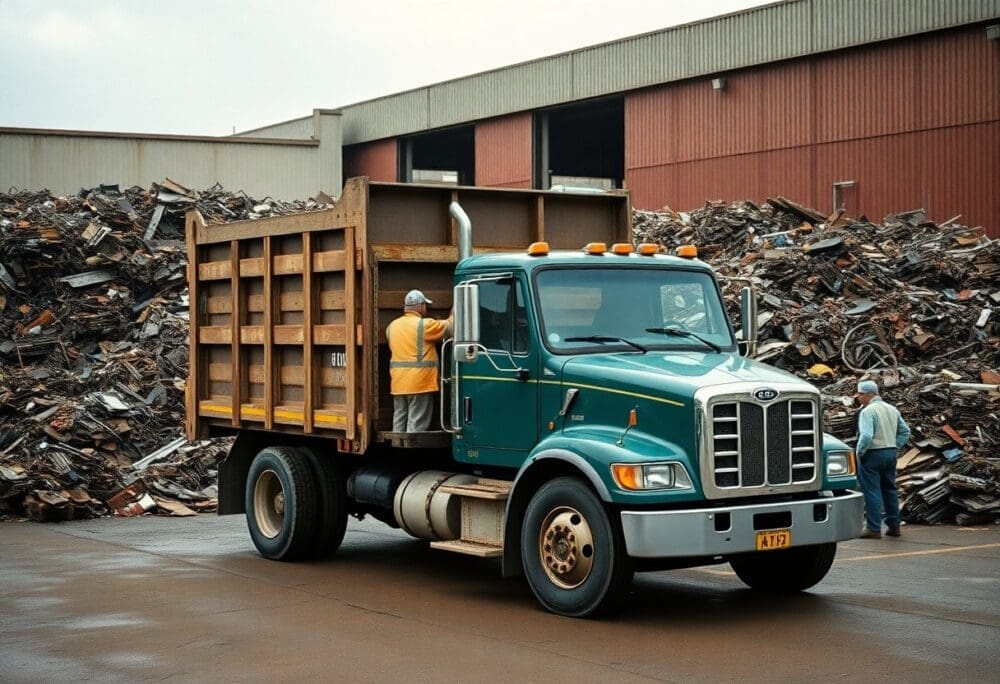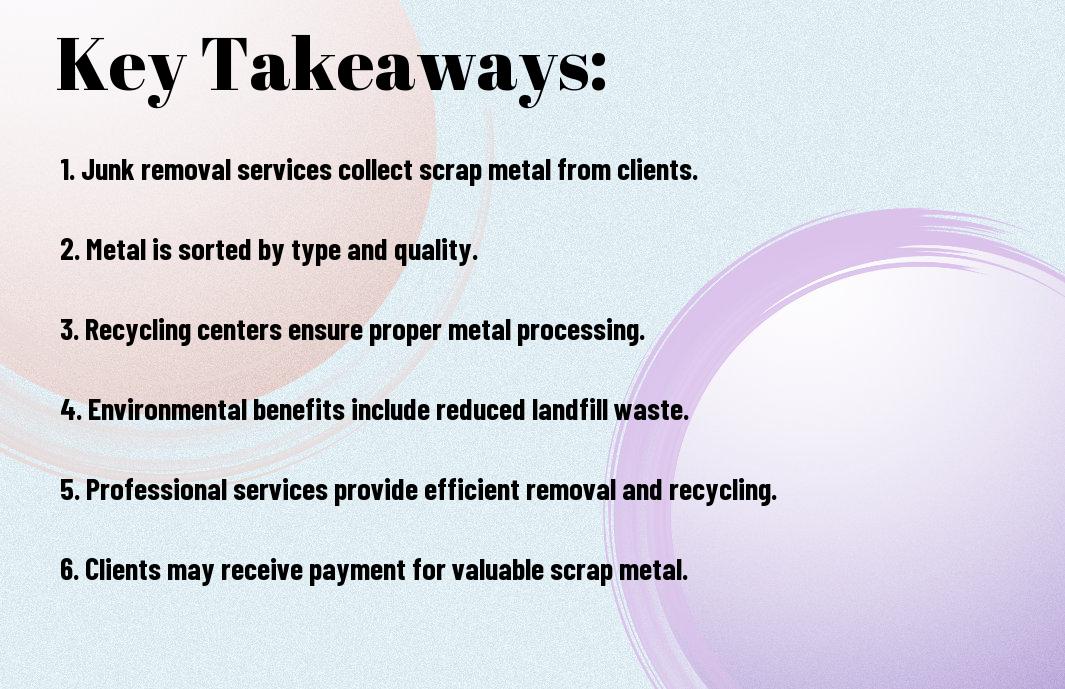Recycling scrap metal is an important part of waste management that you can participate in for both environmental sustainability and economic benefits. When you hire a junk removal service, they efficiently collect and sort your scrap metal, ensuring it gets processed properly. This post will guide you through the steps involved in how junk removal companies manage scrap metal recycling, allowing you to understand the process and make informed decisions about your recyclable materials.
Key Takeaways:
- Junk removal services ensure that scrap metal is sorted and categorized properly before being transported to recycling facilities.
- These services help reduce the environmental impact of waste by promoting the recycling of metal, which conserves natural resources and reduces landfill usage.
- Many junk removal companies offer free estimates and may even provide monetary compensation for valuable scrap metal, encouraging more people to recycle.
Understanding Scrap Metal Recycling
For those participating in the junk removal process, understanding scrap metal recycling is vital. This process involves collecting, sorting, and processing scrap metal to be reused in various industries. By recycling scrap metal, you can contribute to reducing waste and conserving natural resources, as it requires less energy to process recycled metal compared to virgin raw materials.
Types of Scrap Metal
For a successful recycling effort, it’s important to recognize the different types of scrap metal. You can categorize scrap metal into two primary groups:
- Ferrous Metal: Contains iron and is magnetic.
- Non-Ferrous Metal: Does not contain iron and is not magnetic.
After identifying these types, you can efficiently separate and prepare them for recycling.
| Ferrous Metal | Examples: Steel, Cast Iron |
| Non-Ferrous Metal | Examples: Aluminum, Copper |
| Common Sources | Old appliances, vehicles |
| Value Factors | Market demand, purity |
| Recycling Benefits | Conservation, reduced pollution |
The Importance of Recycling Scrap Metal
Behind every piece of scrap metal lies the potential for sustainability. Recycling scrap metal not only helps minimize landfill waste but also conserves valuable natural resources. By choosing to recycle, you support an ongoing cycle that reduces energy consumption and lowers greenhouse gas emissions.
Due to the energy-intensive nature of mining and refining new metals, recycling serves as an effective alternative. With every ton of recycled metal, you save significant energy and resources, contributing to a healthier planet. By participating in scrap metal recycling, you are fostering environmental stewardship and paving the way for a sustainable future. Your efforts make a real difference in creating a more eco-friendly world.
Junk Removal Services
Some people may not realize the benefits of using junk removal services for managing their unwanted items, especially when it comes to recycling scrap metal. These services specialize in collecting, sorting, and disposing of various materials, ensuring that a significant portion goes to recycling facilities instead of landfills.
Overview of Junk Removal
An effective junk removal service streamlines the process of clearing out unwanted items from your home or business. By offering convenient scheduling and efficient pickups, they take the stress out of decluttering while promoting sustainable disposal methods.
How Junk Removal Works
Behind the scenes, junk removal services follow a systematic approach to handling your clutter. They assess your items, determine what can be recycled or reused, and ensure proper disposal of the rest, all while prioritizing environmentally responsible practices.
Removal begins with you scheduling an appointment for the service, during which their team evaluates the items you wish to dispose of. They’ll provide a quote and handle the heavy lifting, so you don’t have to. Once the junk is collected, they sort it appropriately, segregating scrap metal and other recyclable materials. This organized process not only helps clear your space but also supports eco-friendly recycling initiatives in your community, making it a win-win situation for you and the environment.
The Process of Scrap Metal Recycling
After you’ve decided to dispose of your scrap metal, understanding the recycling process is crucial for maximizing its value. Recycling begins with collection and transport, where your discarded metal items are gathered and taken to a processing facility. Once there, they undergo sorting and processing to ensure the metals can be repurposed efficiently, contributing to sustainability efforts and reducing landfill waste.
Collection and Transport
Across communities, junk removal services specialize in collecting scrap metal from residences and businesses. These services make it easy for you to rid your space of unwanted metal items, handling the logistics of transport. By utilizing efficient methods, they ensure your scrap metal reaches recycling centers without delay, promoting effective recycling practices.
Sorting and Processing
Transporting your scrap metal to the recycling facility is just the beginning; the real work happens during sorting and processing.
Scrap metal is meticulously sorted based on its type—ferrous and non-ferrous metals are distinguished, as they require different processing methods. Once sorted, metals are cleaned and processed to remove impurities, which enhances their recyclability. During this phase, you play an integral role; your efforts in collecting and delivering scrap metal directly contribute to a cleaner environment and more sustainable recycling practices. Each piece processed helps create new products, thereby conserving natural resources.
Environmental Impact of Scrap Metal Recycling
To understand the environmental benefits, it’s important to explore how scrap metal recycling reduces pollution and conserves natural resources. By engaging in Scrap Metal Junk Removal: Sustainable Resources, you contribute to a healthier ecosystem, as recycling prevents hazardous waste from reaching landfills and reduces the need for mining new materials.
Reducing Landfill Waste
Reducing landfill waste is vital for maintaining a cleaner environment. By recycling scrap metal, you help divert materials from overflowing landfills, decreasing pollution and the land required for waste disposal. This not only preserves valuable land but also combats the harmful emissions generated from decomposing waste.
Energy Savings and Resource Conservation
Impact of recycling scrap metal goes beyond reducing waste; it significantly saves energy and conserves resources. Recycling metals consumes considerably less energy compared to extracting raw materials, meaning that when you recycle, you are making a substantial contribution to environmental conservation.
Indeed, the energy savings achieved through scrap metal recycling are impressive. For instance, recycling aluminum saves up to 95% of the energy required to produce new aluminum from bauxite ore. This not only cuts down on fossil fuel consumption but also lowers greenhouse gas emissions. By participating in scrap metal recycling, you actively contribute to efficient resource use and a sustainable future.
Choosing a Junk Removal Service for Scrap Metal
Despite the abundance of junk removal services available, selecting the right one for scrap metal recycling can be challenging. You should look for a company that specializes in copper, aluminum, and other types of metal recycling to ensure your materials are disposed of responsibly. A reliable service will not only help you declutter but also contribute to environmental sustainability.
Factors to Consider
Any time you choose a junk removal service, there are several factors you should evaluate:
- Experience with metal recycling
- Proper licensing and certifications
- Transparent pricing structures
- Eco-friendly disposal practices
Thou can benefit from thorough research to ensure you make an informed decision.
Questions to Ask
Consider what questions you might have when choosing a junk removal service. This can help clarify their capabilities and professionalism.
To ensure you select a knowledgeable and trustworthy service, inquire about their experience with scrap metal recycling, pricing, and disposal methods. Ask if they are familiar with local recycling laws and how they sort and manage your scrap metal. This will help you gauge their commitment to environmentally responsible practices and ensure you’re making a choice that aligns with your values.
Legal Regulations and Guidelines
All junk removal services must navigate a complex landscape of legal regulations and guidelines when it comes to scrap metal recycling. Local and national laws dictate how various types of metal should be handled, recycled, and disposed of. Ensuring compliance with these regulations not only protects the environment but also helps you avoid potential fines or legal issues. It’s crucial for junk removal companies to stay informed and adhere to these laws, setting a high standard for responsible recycling practices.
Recycling Laws
Recycling laws vary significantly by location, impacting how you should approach scrap metal disposal. Many jurisdictions require specific permits for handling recyclable materials, particularly metals. Knowing these laws helps you make informed decisions about where and how to recycle, ensuring that you fulfill your legal obligations while contributing to a more sustainable environment.
Compliance and Best Practices
On the topic of compliance, junk removal services must adopt best practices to meet both local and federal regulations regarding scrap metal recycling. This includes understanding what materials can be recycled, proper sorting techniques, and secure transportation methods. Adopting these practices not only fosters environmental responsibility but also improves your service’s overall efficiency and reputation.
Also, utilizing best practices in compliance means staying updated with changes in legislation and fostering relationships with recycling centers. Regular training for your team on safety and recycling procedures can enhance your operational standards. Establishing a transparent process for clients ensures their understanding of how their metals are being recycled, building trust and encouraging responsible disposal habits.
Summing up
Now that you understand how junk removal services handle scrap metal recycling, you can make informed decisions about your own scrap. By opting for professional junk removal, you ensure that your scrap metal is efficiently collected, sorted, and processed, minimizing environmental impact. Utilizing these services not only alleviates the burden of handling bulky items but also supports responsible recycling practices. When you choose to recycle scrap metal, you contribute to a more sustainable future while freeing up valuable space in your home or workplace.
FAQ
Q: What types of scrap metal can be recycled through junk removal services?
A: Junk removal services typically accept a variety of scrap metals for recycling. Common recyclable metals include aluminum, copper, brass, steel, and iron. Items such as old appliances, car parts, and construction scrap can all be collected and processed. It’s important to check with your local junk removal service to understand specific restrictions or guidelines, as some companies might have limitations based on the type or condition of the metal.
Q: How does the junk removal process for scrap metal work?
A: The junk removal process for scrap metal typically begins with the customer contacting the service to schedule a pickup. The removal team arrives at the designated location, assesses the materials, and provides an estimate based on the quantity and type of metal being collected. Once agreed upon, the team safely loads the metal onto their vehicle. After collection, the scrap metal is transported to a recycling facility where it is sorted, processed, and prepared for reuse in manufacturing.
Q: Are there any costs associated with junk removal of scrap metal?
A: Yes, there may be costs associated with the junk removal of scrap metal, depending on the service provider and the volume of material. Some companies may offer free pick-up for larger quantities of metal or for certain items, while others may charge a fee based on weight or volume. It’s advisable to inquire about pricing upfront and confirm if any items are eligible for free removal. Some services also provide a payment option for valuable metals, contributing to the overall cost-effectiveness of scrap metal recycling.







